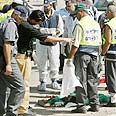
'Islamic Jihad behind Beer Sheva attack'
Palestinians reveal identity of suicide bomber, 25 year-old Islamic Jihad member
However, Israeli security officials said the identity of the attacker remains unclear at this stage.
50 people were injured in the attack, two of whom are in serious condition, and the remainder of the victims suffered shock following the attack.
Zaakik was in prison for five years in Israel in the past.
Earlier, Pini Hadash, head of the Omar Regional Council, said that “the security fence in southern Har Hebron is completely porous.”
“Palestinian vehicles freely travel the area, and there are no police forces to stop this,” said Zaakik.
“The only complaint Palestinians have is the cost of the ride to Beer Sheeva, charged by Bedouins who live in the area."
No surprises among security officials
Despite the lack of surprise among security officials, the decision has been taken to conduct only pinpoint anti-terror operations, and to work to prevent ‘ticking bombs’ from going off.
In the months before the disengagement, the security agencies decided to expand operations against the Islamic Jihad, and senior defense figures repeatedly said that the terror organization was not immune from harm, since it refused to partake in the ceasefire.
With the start of the disengagement, the IDF has stepped down its operations against Islamic Jihad.
Meanwhile, the condition of the two guards who were injured while taking on the suicide bomber in Beer Sheva remains critical, and one man is suffering from life threatening conditions.
The Soroka hospital in Beer Sheva said that the two men are in surgery, and will be transferred to an intensive care unit, where their condition will be reassessed.
Hanan Greenberg and Anat Barshkovsky contributed to this report










